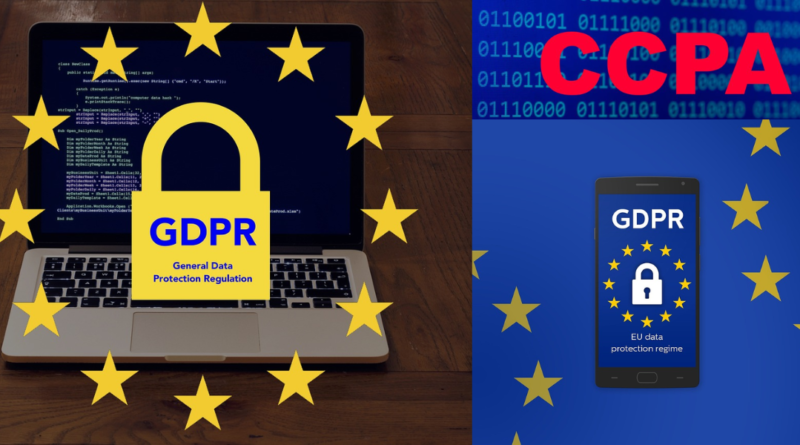Data Privacy in the Digital Age: GDPR and CCPA

Introduction:
Data privacy safeguards are now essential in a world where digital interactions rule and personal stories are easily shared with a single click. This investigation will cover the most recent legal safeguards, including the California Consumer Privacy Act (CCPA) and the General Data Protection Regulation (GDPR), as it delves into the nuances of data privacy. Gaining an understanding of these legal environments is essential for both individuals and businesses to strengthen the defenses surrounding sensitive data.
The Essence of Data Privacy:
- Definition: Data privacy is the safeguarding of private data from illegal access, use, or disclosure.
- Scope: Data is generated and shared at an exponential rate in the digital age, from social media interactions to online purchases.
- Importance: Securing personal data enables ethical use of personal information, avoids identity theft, and promotes trust.
GDPR (General Data Protection Regulation):
Enforcing GDPR:
- Developing a comprehensive framework for data privacy and protection, the European Union (EU) created the General Data Protection Regulation (GDPR). GDPR,https://en.wikipedia.org/wiki/General_Data_Protection_Regulation which went into effect on May 25, 2018, attempts to empower people and standardize data protection regulations throughout the European Union (EU) and the European Economic Area (EEA).
Important Notes:
- Right of Access: Enabling people to call upon their personal information whenever they like.
- Data privacy portability: Enabling people the right to access and use their data for their own objectives
- Consent: requiring companies to get express, unambiguous consent before orchestrating data processing.
Effect on Companies:
- Global Reach: GDPR applies to organizations outside the EU that process data on EU residents.
- Fines: Non-compliance can result in substantial fines, emphasizing the seriousness of data privacy protection.
CCPA (California Consumer Privacy Act):
Enforcement:
The California Consumer Privacy Act (CCPA) stands as a pivotal legislative milestone, designed to safeguard the rights and privacy of individuals residing in the state of California. Enacted in January 2020, CCPA introduces a new era of consumer-centric data protection, granting residents greater control over their personal information in the digital realm.
Key Provisions:
- Right to Know: Giving customers the authority to inquire about the types and sources of their personal information
- Right to Delete: Giving customers the ability to ask for their personal information to be deleted
- Opt-out rights: giving customers the option to remove their personal information from the market.
Impact on Businesses:
- Challenges with Compliance: Organizations need to change how they handle data in order to comply with the CCPA.
- Customer-Centric Approach: The CCPA forces a paradigm shift by calling on companies to be transparent about how they acquire and use data.
Significance of Data Privacy in the Digital Age:

- Trust Elevation: Businesses that protect and uphold data privacy are granted the key to winning over customers’ trust, surpassing even basic functioning.
- Consequences for Law: Beyond the harsh legal penalties, a company’s reputation can be damaged by non-compliance with data privacy regulations, which can lead to a hazardous minefield.
- Ethical Imperative: In the intricate web of digital contacts, respect for data privacy is an ethical need that goes beyond legal requirements.
Best Practices for Ensuring Data Privacy:
- Encryption of data privacy: Like an unbreakable wall, encryption is the last line of defense for confidential data.
- Frequent Audits: Setting the standard for attentiveness, these once-a-year evaluations of data handling procedures work as a compass, pointing the way toward compliance.
- Educating Staff: Employee education serves as the cornerstone for bolstering data privacy rules by bringing awareness into the business culture.
The Evolving Landscape:
- Emerging Regulations: As technology develops further, new laws pertaining to data privacy will probably come into being. It’s essential to be knowledgeable and flexible when negotiating in this dynamic environment.
- Global Alignment: To highlight the universal agreement on the necessity of strong data protection, several nations are investigating or enacting laws like the CCPA and GDPR.
Challenges in Data Privacy:
- Data Breaches: In spite of laws, data breaches continue to be a serious problem. To reduce these hazards, proactive thinking and unwavering attention are required.
- Innovation and Privacy: Businesses always struggle to find a way to combine the use of data for innovation with the protection of individuals’ rights to privacy.
Privacy by Design
- Privacy: ‘Privacy by Design‘https://en.wikipedia.org/wiki/Privacy_by_design refers to the idea of including data privacy safeguards from the beginning of the development process of goods and services.
- User-Centered Method: Businesses may build user-friendly experiences that comply with regulations by giving privacy first priority during the design phase.
Empowering Users:
- Transparency: Giving people information about how their data is gathered, handled, and used fosters trust and gives them the power to make wise decisions.
- User Control: Enabling people to make changes to their preferences and remove information from their data enables them to have better control over it.
Future Trends in Data Privacy:
- Blockchain Technology: By being decentralized, blockchain technology has the potential to improve data security and transparency.
- AI and privacy: As AI applications expandThe Role Of Artificial Intelligence in sustainable agriculture, it will be critical to address the moral ramifications and guarantee privacy in automated decision-making systems.
Beyond Compliance:
- Ethical Data Practices: Adopting ethical data practices includes a dedication to justice, responsibility, and openness in the handling of data, going beyond regulatory compliance.
- Corporate Social Responsibility: Encouraging data privacy may have a good effect on a business’s reputation and foster a trusting environment.
Resources for Staying Informed:
- Official Websites: Stay up to speed on rules and developments by often visiting the official websites of regulatory agencies.
- Conferences held by the industry: To keep up with the most recent advancements, attend conferences and webinars centered around data privacy.
- Legal Advice: In order to guarantee continuous compliance, speak with attorneys that specialize in data privacy.
Conclusion:
In the digital era, maintaining data privacy takes constant effort, a dedication to developing best practices, and close attention to the legal environment. Businesses may not only adhere to legal requirements but also foster a culture of trust, creativity, and responsible handling of data by comprehending and putting into practice the ideas contained in legislation such as the CCPA and GDPR. Future generations’ digital landscapes will be shaped by the merging of privacy protection with technical growth.




